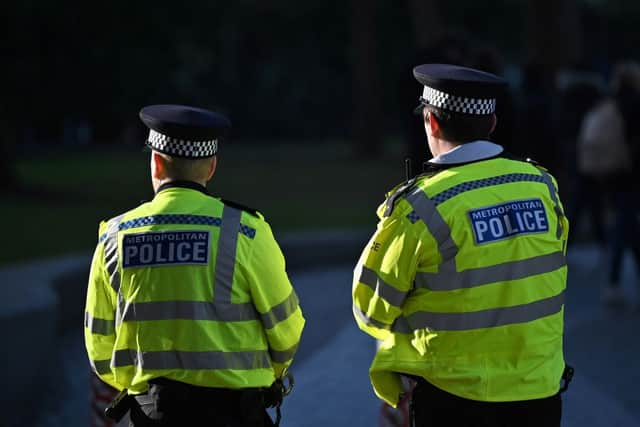Public trust in police ‘hanging by a thread’ in wake of ‘dreadful’ scandals and failings, watchdog warns
and live on Freeview channel 276
Public trust in the police has fallen to an all-time low and is currently “hanging by a thread”, the policing watchdog has warned.
The lack of faith in police comes in the wake of a series of “dreadful” scandals and systemic failings, with Chief inspector of constabulary Andy Cooke describing the police service as being at a “historic turning point”.
Advertisement
Hide AdAdvertisement
Hide AdThe watchdog is calling for legal powers so that inspectors can order failing police forces to improve when there are serious concerns for public safety.
Mr Cooke stressed the need for “definitive action” to improve standards instead of “glossy strategies and mission statements” that do not bring about lasting change.
He says this would allow more scrutiny over vetting and recruitment in the police andurged Home Secretary Suella Braverman to give serious consideration to the proposals and bring forward draft legislation.


The wide-ranging powers would mean the watchdog could tell police to make changes when serious public safety concerns were identified, meaning forces would be legally required to comply.
Advertisement
Hide AdAdvertisement
Hide AdAt the moment, inspectors have a legal power to enter police stations and demand documents but have no powers to enforce any recommendations that are made. If the changes are introduced, it could also see the watchdog reinstated as having a role in selecting and appointing chief constables.
Setting out his first annual assessment of policing in England and Wales since he was appointed to the role, Mr Cooke said: “Through the withdrawal from neighbourhood policing and the dysfunctionality of the criminal justice system, some critical elements – the police’s governance, leadership and workforce arrangements – need substantial reform.
“Included in that reform should be additional powers for the inspectors of constabulary so we can make changes happen when they’re needed.
“Too often we’ve seen forces failing to act, or not acting quickly enough, to address our recommendations. This includes a power for me as chief inspector to give directions to a police force where there are serious public safety concerns.”
Advertisement
Hide AdAdvertisement
Hide AdMr Cooke highlighted examples of the watchdog repeatedly raising concerns since 2016 on vetting and the abuse of power by police officers for sexual purpose, but said he has seen little improvement in standards.
He told reporters: “And in those seven years, we had some truly horrendous acts by police officers. Now I’m not sitting here saying that wouldn’t have happened if they would have done our recommendations earlier.
“But surely the question’s got to be asked if I could direct around those issues, as opposed to recommending, a lot more would have been done a lot quicker.”
Asked what sanctions forces could face if they still failed to comply under the plans, he said it would be for Parliament to decide but referred to powers of police and crime commissioners to dismiss chief constables.
Advertisement
Hide AdAdvertisement
Hide AdMr Cooke, who previously served as a police officer for 36 years, insisted policing was not “broken beyond repair” but that the service had a “limited window of opportunity” to rebuild public trust.
He says police are still “missing the basics” on too many occasions and need to be more efficient, adding that officers had lost “discipline” and said professionalism – including the importance of wearing a smart uniform – needs to be drummed into recruits and upheld by bosses.
At best, people are left dissatisfied and at worst left at risk, he said, adding: “Victims are increasingly less satisfied with the way they are treated by the police and the criminal justice system.”
Mr Cooke added that the problems faced by forces are also not helped by a funding system which is “not fit for purpose” and a “dysfunctional and defective” criminal justice system.
Advertisement
Hide AdAdvertisement
Hide AdHe defended stop and search as an “essential tool in preventing and detecting crime”, but said police need to better understand how to use it “effectively and fairly”. He also said it was not the job of officers to “champion social change” or “take sides” on social issues, adding: “The police are there to uphold the law. And it’s not for individual police chiefs to decide which causes they support or not.”
The police chief also spoke of concern regarding reports that corrupt officers were switching to using Telegram and auto-deleting messages, instead of Whatsapp, to avoid being caught.
He added: “Policing needs to redouble its efforts to identify those people who totally besmirch the proud reputation that British policing has. We will never totally eradicate every corrupt officer but the police service needs to be doing all it can to ensure that these individuals are identified as soon as possible.”
